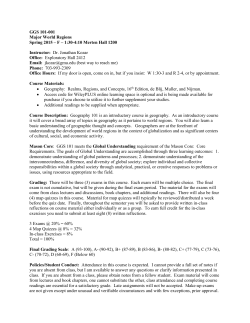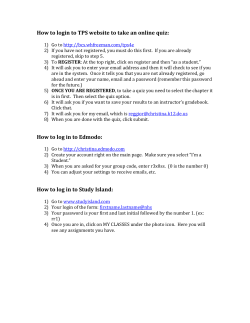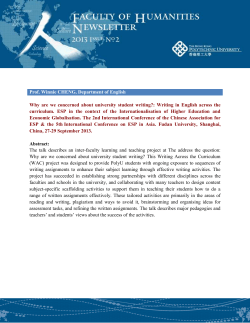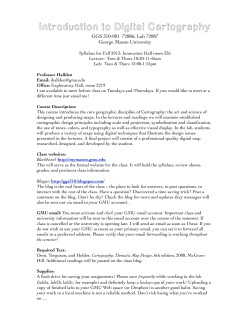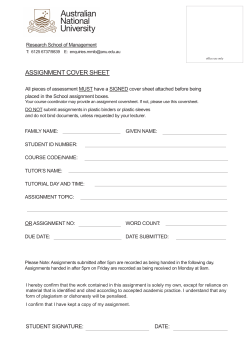
San Diego State University Spring 2014 Schedule #20721, section 4
San Diego State University Spring 2014 CJ 540: Planning and Evaluation in Criminal Justice Mon/Wed 2:00-3:15 pm Schedule #20721, section 4 Instructor: Sylvia Valenzuela, Ph.D. E-mail: svalenzuela@mail.sdsu.edu Office Hours: Monday 3:30 – 4:30, Tuesday 2 – 3 pm, and by appointment. Office: PSFA 178 Teaching assistants: Amanda Ames aames_27@yahoo.com Sam Cherry sam.cherry02@gmail.com COURSE DESCRIPTION This course offers an introduction to basic techniques in criminal justice research including: research writing, components of research design models, sampling and data collection techniques, for both quantitative and qualitative methods. An emphasis will be placed on bridging the gap between theory, research, and criminal justice policy. In addition, the multidisciplinary nature of criminal justice research will be highlighted. COURSE OBJECTIVES: Upon successful completion of the course, you should be able to: Formulate testable research questions and hypotheses for criminal justice related topics; Select the appropriate research design and method for a particular research question; Identify the advantages and disadvantages of different research designs; Identify the sampling strategies available for any given research design, as well as the advantages and disadvantages associated with each; Discuss the strengths and weaknesses of quantitative and qualitative research methods; Be able to understand, summarize and critique research from multiple disciplines and; Think scientifically about social problems; Recognize signs of strong and weak social science research. REQUIRED TEXT AND READINGS Bachman, R. and Schutt, R. K. 2014. The Practice of Research in Criminology and Criminal Justice, 5th Edition. Thousand Oaks, CA: Sage. Various readings to be posted on Blackboard METHOD OF EVALUATION Each student is expected to attend class regularly, complete the assigned readings, homework and group projects, and participate in discussion. Failure to attend class or submit assignments on time will diminish your grade in this course. Grades will be based on the following: Online quizzes (10 points each) Midterm 100 points 50 points 1 San Diego State University Spring 2014 Homework & attendance Literature review Final Project Final exam Total 100 points 100 points 100 points 50 points 500 points This class will incorporate the use of homework, group work, discussion and quizzes to practice the principles learned from lecture and the textbook. It is imperative that you attend class regularly because both lecture and practice are fundamental in learning research methods. Only students with valid documentation will be allowed to make up missed assignments. No late or emailed assignments will be accepted. Therefore if you miss class you may miss an assignment. Homework: Depending on the particular topic covered in class, occasionally you will be given homework assignments to be completed before the next class meeting. Homework is due at the beginning of class (hard copy only). No late or emailed assignments will be accepted! Occasionally homework will be due via Blackboard dropbox or discussion board. Quizzes: Quizzes will test you on topics and concepts discussed in lecture & readings. They will be posted on Blackboard and are to be completed online. This will require reliable internet connectivity. If you do not have this at home you are strongly encouraged to take the quizzes in the computer lab on campus. Not having a strong internet connection is NOT a valid excuse for missing a quiz. Writing assignments: Students will complete a writing assignment applying the research and analytical skills learned in the course. This writing assignment will be described in detail in a separate document later in the semester. Essentially, you will critique an empirical article from a methodological perspective using the skills and knowledge obtained in the course. a. No late papers will be accepted. You are always welcome to turn in an assignment before the due date. b. Emailed assignments are NOT accepted. c. Assignments must be submitted in hard copy. d. If you are not a strong writer, you are encouraged to visit the writing center in PSFA for assistance. Midterm and Final exam: The midterms and final exams will include multiple-choice, true/false, and may include short answers questions. The final exam will not be cumulative. Final project- The final project will require you to put to use the knowledge of research methods you gained by designing a research study and creating a survey. More detailed instructions will be provided later in the semester. 2 San Diego State University Spring 2014 COURSE ISSUES AND POLICIES Course Website and Blackboard: It will be crucial for every student to gain access to the course website as various important announcements and additional course materials (i.e. on-line readings) will be posted on the site. In addition, it is expected that students have an updated email account, so that they can receive group e-mails. Email: I make every effort to respond to emails quickly, please reserve emails to important questions. In your email please include your name and which section (date & time) you are in. I am teaching three sections of CJ 540 so please indicate which class. Classroom Policies: You are expected to arrive on time, and to not disrupt instruction through talking, laughing, receiving phone calls, snoring, etc. Students are expected to freely express their views on the various CJ topics that will be discussed in class, as long as they are respectful of their fellow classmates and their instructor. Please avoid offensive language and behavior or you will be asked to leave. Class attendance is important, students should come to class prepared and interested in learning! I expect, encourage, and invite participation. Late and missed assignments: No late assignments will be accepted! If you have documentation of having a serious medical illness, death in the family, or other compelling reason you will be allowed to make up the missed assignment. However, you are responsible for providing documentation and timely notice. Students with Disabilities: Disabled students are encouraged to discuss with the instructor how their disability may impact on this course. Course requirement modifications and other accommodations may be provided after proof of eligibility has been provided to DSS staff. For further information, please contact Disabled Students Services. Academic Dishonesty: Make sure to follow APA format on your paper (you will learn in class), do not plagiarize or cheat or disciplinary action will be taken. Grades: The plus/minus grading scale follows this distribution: 94-100% = A 90-93.9% = A88-89.9% = B+ 83-87.9% = B 80-82.9% = B- 78-79.9% = C+ 73-77.9% = C 70-72.9% = C68-69.9% = D+ 60-67.9% = D 59.9 % or lower = F 3 San Diego State University Spring 2014 PROJECTED COURSE SCHEDULE* Week Topic Readings Assignment 1 Jan 22 -Introduction to course -Discuss syllabus On-line reading: Facebook Use Predicts Decline in Well-Being -Article summary -Why are you a CJ major? 2 Jan 27 & 29 -Science, Society, & Criminological Research -Discuss reading Chapter 1 Quiz #1 -Types of research & errors in reasoning 3 Feb 3 & 5 -The Process and Problems of Criminological Research -Movie: Kinsey Chapter 2 Quiz #2 Article: The Demedicalization of -Article summary Self-Injury 4 Feb 10 & 12 -Research Ethics and Philosophies -Movie: The Experiment Chapter 3 5 Feb 17 & 19 Conceptualization and Measurement Chapter 4 Article: The Minneapolis Domestic Violence Experiment Quiz #4 Article summary 6 Feb 24 & 26 -Sampling Library & APA instruction Quiz #5 Library assignment 7 Mar 3 & 5 Catch up 8 Mar 10 & 12 - Causation and Research Design Chapter 5 Quiz #3 Chapter 6 Midterm March 10 (ch. 1-5) 9 Mar 17 & 19 -Causation & Research Design cont. -Experimental Designs -Review midterm Chapter 6 cont. Chapter 7 Quiz #6 10 Mar 24 & 26 -Experimental Designs cont. Chapter 7 Quiz #7 Writing Assignment Due 11 Mar 31 & Apr 2 Spring Break 2 San Diego State University Spring 2014 12 Apr 7 & 9 -Survey research Chapter 8 Quiz #8 Homework TBD 13 Apr 14 & 16 -Qualitative methods of analysis Chapter 9 On-line readings: Consuming Eroticism Quiz #9 -Field observations -Article summary 14 Apr 21 & 23 -Analyzing Content -discuss article Chapter 10 -Homework TBD 15 Apr 28 & 30 -Evaluation and Policy Analysis Final project due Chapter 11 16 May 5 & 7 -Mixing and Comparing Methods -Final exam review Chapter 12 FINAL EXAM Monday, May 12 1:00 – 3:00 pm *This is intended as a working schedule and may change. 3 Quiz #10
© Copyright 2025



